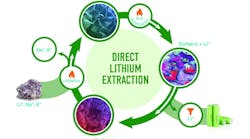More than 934 million pounds of post-consumer rigid plastics were recycled by the United States and Canada in 2011, which was 13 percent more than in the previous year, according to a new report from the American Chemistry Council (ACC). The figures do not include plastic bottles, which are tracked separately.
According to a separate report, Plastics Recycling Collection: National Reach Study 2012 Update, the number of people who had access to local recycling for non-bottle rigid plastics rose to 57 percent between 2011 and 2012, suggesting a possible reason behind the increase in recycled plastics volume, the ACC said.
Steve Russell, vice president of the plastics department of the ACC, commented that even though the increasing volume of recycled rigid plastics was good news, the U.S. plastics industry still had a lot of work to do to improve these readings. He stated that the industry was not doing "really well enough" but noted that there was a positive trend towards improvement.
The 2011 National Postconsumer Non-Bottle Rigid Recycling Report revealed that over 1,400 cities and 300 counties in the United States collected all rigid plastic containers, as well as plastic bottles, in 2011. Rigid plastics include bottles, caps, cups, trays, boxes, clamshells, lids and bulky plastics like crates, buckets, toys and lawn furniture, the ACC explained. Moreover, it was estimated that at least 94 percent of the U.S. population had access to recycling for PET and high density polyethylene (HDPE) bottle and caps, while just over half had access to recycling for all plastic bottles and non-bottle rigid containers, the report found.
RELATED: Ethane fuels growth in US petrochemical industry
The ACC distinguished between two key categories of rigid containers. The first one included HDPE rigid cups, tubs and containers, whereas the second one consisted of PET trays, clamshells and cups. Overall, the report discovered that the total number of consumers with access to recycle both categories is now over 60 percent — an important metric, because for the first time those containers can be labeled "recyclable" without additional qualification under the Federal Trade Commission's guidelines.
Russell stated that the United States could look at other countries that have successfully implemented recycling programs in a bid to increase recycling rates. In many European countries, for example, single-stream recycling programs have been put in place quite efficiently, he pointed out. However, Russell explained that even countries noted for their successful recycling programs have recycling rates at about 30 to 35 percent overall, whereas those that stand out as top performers reach about 50 percent.
Currently, the Unites States recycles about eight to 10 percent of its rigid plastics but an accurate evaluation of the total volumes is difficult because the figures also include durable plastics intended to last for several decades, according to the report.
In 2011, some 61 percent of the rigid plastics collected was recycled in the United States or Canada, compared to just one-third of the total amount of plastics processed domestically in 2007. The majority of recovered rigid plastics were olefin materials, such as high and low density PE and polypropylene, the ACC found.


